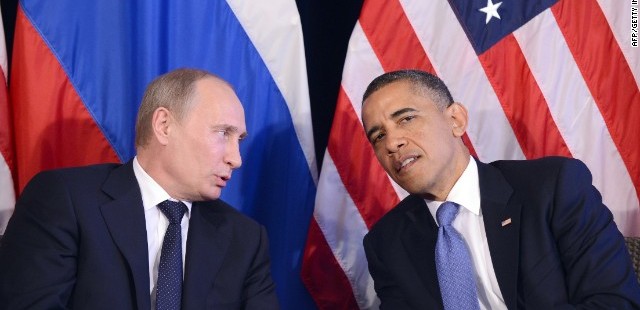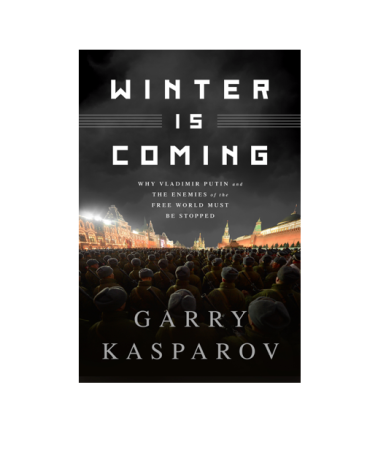

By Garry Kasparov
(CNN)When Russia invaded Ukraine in early 2014, eventually annexing the Crimean peninsula, the world seemed stunned. Yet it is difficult to see why. After all, there had been months of menacing rhetoric from the Kremlin as Ukraine’s Maidan revolution cast out Russian President Vladimir Putin’s ally Viktor Yanukovych. But the West had apparently forgotten Russia’s 2008 invasion of Georgia, the other non-NATO, former Soviet state that was leaning westward and embracing democracy — positions unacceptable to Putin.
Ukraine was never going to be the end of the Russian dictator’s ambitions. Putin needs a steady diet of escalating conflict. And without a more strategic game plan among U.S. and other policymakers in the free world, Moscow and others will continue to step in where the West refuses to tread.
Like many others, I believed that Putin’s next show of force might be in the Transcaucasian region. But in September of this year he surprised the world again by intervening even further south, all the way down in Syria where he is hoping to prop up his old dictator pal, President Bashar al-Assad.
Once again, the world was caught flat-footed, with the apparent exceptions of Iran and probably Iraq, both of whom quickly revealed themselves as Russian partners. Meanwhile, even as Russia claimed that its military was focused on attacking the Islamic State of Iraq and Syria (ISIS), it has been clear that Russian airstrikes have actually been focusing on non-ISIS, anti-Assad elements, some of whom were actually trained by the United States. Assad wants to be able to depict himself as the only alternative to ISIS and, after enough bombing, he will be.
The move is a classic play from the dictator’s handbook, in which dictators portray themselves as white knights even as they try to destroy all legitimate opposition, turning the political environment into a desert in the process. And what manages to survive in a desert? Snakes, rats, and scorpions.
As with Ukraine and the worthless Minsk ceasefires, Putin is happy to negotiate once he has achieved dominance on the ground through the use of force. And the reality is that all the well-fed diplomats in Vienna won’t change anything in Syria. Putin sends bombers, Iran sends troops, and Obama sends John Kerry. Is it any wonder who is calling the shots in Syria now?
How does this keep happening?
The United States is the richest and most powerful nation in the history of the world. Yet U.S. President Barack Obama appears to have no interest in flexing those economic and military muscles to defend U.S. interests. Quite to the contrary, they are atrophying. But the blame cannot be laid squarely at the White House’s door. Even as Putin is bullying his way around the globe, Europe is failing to properly protect its own borders, apparently hoping Putin will simply stop in Ukraine. But why should he?
Part of the problem is that, to use some chess terminology, dictatorships have a clear advantage when it comes to rapid tactical maneuvers. Parliamentary authorization is not necessary, there is no critical media. Dictators don’t worry about long-term consequences, only about looking strong and staying in power now. They know that they cannot afford to look weak or get distracted.
Even the most long-lived dictators rarely look beyond tomorrow’s battles because it’s hard to look toward the future when you always have one eye over your shoulder. Putin, for example, may well be stuck in quagmires in both Ukraine and Syria. But he cannot slow down at all — he needs ever more action, more conflict, and more mud in the water to rally domestic support and justify his position as Russia’s president for life. What is good for Putin has nothing to do with what is good for Russians and Russia’s national interest. In fact, they are usually opposed.
Democracies, in contrast, can be very slow to act tactically due to the multiple layers of public opinion, governmental accountability, and other systemic checks and balances. The strength of the free world is strategic, not tactical. Common goals, political and economic stability, and strong institutions allow for long-term planning and continuity.
After World War II, U.S. President Harry Truman’s administration recognized the need for a new set of institutions, mostly to counter Stalin’s aggressive Soviet Union. The 1947 “Truman Doctrine” established a principle of opposing Soviet advances wherever possible. Within the first several years of World War II ending we saw the birth of NATO, the United Nations, and the CIA, as well as the transformation of Voice of America from a wartime radio network into a State Department vehicle.
Unfortunately, although they all still exist today, to differing degrees they have lost their focus in the post-Cold War world. NATO, for example, won’t arm or defend non-member Ukraine, although it is finally beefing up its defenses along the “Russian front” due to the demands of justifiably nervous former Soviet bloc nations like Poland and Lithuania. The United Nations, for its part, has Saudi Arabia, Cuba, and Russia on its Human Rights Council.
The end of the Cold War really necessitated a new set of institutions, or at least a serious revamping of existing ones, and failing to do this is the signal failure of global policy since the fall of the Berlin Wall. But even though our institutions may be dated, it is still worth remembering the words of the leader who created them, because his advice holds many truths applicable today.
Truman’s lesson for today
In a mostly forgotten speech in 1951, dedicating the “Four Chaplains” chapel in Philadelphia, President Truman defended U.S. military involvement in Korea and elsewhere, openly comparing it to efforts to bring the rule of law to the American western frontier.
“Men who wanted to see law and order prevail had to combine against the outlaws. They had to arm themselves. At times they had to fight,” he said.
And Truman also understood that conceding in faraway places would only bring greater disaster later. “Our men are in Korea because we are trying to prevent a worldwide war. The men who have died in Korea have died to save us from the terrible slaughter and destruction which another world war would surely bring.”
Of course, Truman’s somewhat paternalistic attitude toward world order, and his belief in the need for American leadership against communism, are also in some ways dated. And while Truman spoke of alliances and partners, back in 1951 everyone knew that if the United States did not lead the fight against Stalin’s ambitions there would be little fight at all. But the questions today are not so much of might, but of mission, will and leadership.
Last month, I visited the demilitarized zone between North and South Korea as part of a Human Rights Foundation project. From the vantage point of the DMZ, the importance of Truman’s courage is as visible as the light and dark that divide the thriving democracy of South Korea from the horrifying gulag of Kim Jong Un. It was a reminder that the Korean people’s fight against communist aggression was supported by the United States, which sacrificed nearly 37,000 lives there, and that 50 million South Koreans live in freedom today because of that support.
It should go without saying that no action or intervention ever goes exactly as planned. There will always be setbacks and failures, often with tragic consequences. But while it is easy to find fault with past American interventions overseas, as someone who was born in a totalitarian country I cannot in my heart condemn the effort to defend the lives and freedom of people resisting tyranny, nor mourn the demise of dictators like Saddam Hussein or Moammar Gadhafi. It is absurd to expect peace and democracy to immediately flower in deserts that have known only brutal dictatorship for so long, but this should not be an argument against taking action at all. In fact, it is an argument to act sooner, before too much damage is done.
Today, the West is playing the dictators’ purely tactical game, and losing. It is being dragged out of strategic cooperation and away from policies based on principles, resulting in fatal hesitancy and disarray. What is needed is a strategic approach to today’s challenges, and to achieve that the United States must establish clear goals and it must be willing to lead.
Let us again go back 60 years, to that chapel in Philadelphia, where Harry Truman uttered a sentence that stopped me cold when I read it, one that is as true now as it was then. The voice of history calls to us when Truman proclaimed, “We cannot lead the forces of freedom from behind.”
Garry Kasparov, former world chess champion and chairman of the New York-based Human Rights Foundation, is the author of “Winter Is Coming: Why Vladimir Putin and the Enemies of the Free World Must Be Stopped.”

